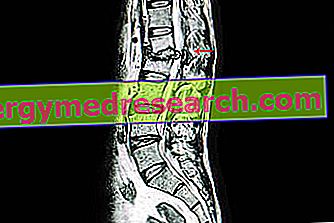
What is Tysabri?
Tysabri a concentrate that must be diluted to obtain a solution for infusion (drip into a vein). Contains the active ingredient natalizumab.
What is Tysabri used for?
Tysabri is used to treat adults with multiple sclerosis (MS). It is indicated for the treatment of the form of MS known as "relapsing-remitting", that is when the patient suffers from neurological attacks (relapses), followed by periods of recovery without symptoms (remissions). The medicine is used in the following cases:
high activity of the disease, despite therapy with interferon-beta (another type of medicine used in MS) or severe and rapidly deteriorating disease.
The medicine can only be obtained with a prescription.
How is Tysabri used?
Treatment with Tysabri must be initiated and supervised by a physician experienced in the diagnosis and treatment of nervous system diseases, who has easy access to a particular diagnostic device: the magnetic resonance imaging (RM) apparatus. This equipment will allow the doctor to monitor brain alterations caused by MS or the rare brain infection called progressive multifocal leukoencephalopathy (PML). Tysabri is given by infusion over a period of one hour every four weeks. Because the infusion can trigger an allergic reaction, the patient must be monitored both during the infusion and the next hour. If the patient does not show clear signs of therapeutic benefit after six months, the doctor will have to consider whether to continue the treatment. Patients treated with Tysabri must be given a special alert card summarizing the main information on the safety of the medicine. Patients must have their partner's or caregiver's card read the alert card, as well as other doctors who are treating them, as they may notice the symptoms of people with SCI that patients do not realize, such as changes in mood and behavior or alterations of the word.
How does Tysabri work?
The active substance in Tysabri, natalizumab, is a monoclonal antibody. A monoclonal antibody is an antibody (type of protein) created to recognize and bind to a specific structure (called an antigen) present on some cells in the body. Natalizumab was created to bind to a specific part of an integrin, called _4_1 integrin, which can be found on the surface of most leukocytes (white blood cells that intervene in the inflammatory process).
Multiple sclerosis is a nerve disease in which inflammation destroys the protective sheath that surrounds nerve cells. By blocking the integrin, Natalizumab prevents leukocytes from reaching the brain through the blood. In this way the inflammation is reduced, as well as the nerve injury caused by MS.
What studies have been carried out on Tysabri?
The effects of Tysabri were first tested in experimental models before being studied in humans. Two studies, both lasting two years, examined the efficacy of Tysabri in the treatment of MS. One study compared used Tysabri (monotherapy) with a placebo (a dummy treatment) on 942 patients. The other study analyzed the effect produced by the use of Tysabri in combination with interferon beta-1a (another medicine used in the treatment of MS) on 1, 171 patients. The main measures of effectiveness were the reduction in the number of relapses and the variations in the patient's level of disability measured on the basis of a standard scale (the expanded scale for the state of disability).
What benefit has Tysabri shown during the studies?
In the monotherapy study, Tysabri was more effective than placebo in reducing the number of relapses. After one year there was a decrease of about two thirds in the number of MS attacks in patients treated with Tysabri compared to patients treated with placebo. Tysabri was also more effective than placebo due to the disabling effects of MS: over two years, the risk of disability progression was reduced by 42% compared to the placebo group.
In the complementary study with interferon beta-1a, the risk of worsening disability and the number of relapses were reduced. However, the way the study was conceived did not make it possible to clearly identify whether these results were due to Tysabri alone or to the combination.
What are the risks associated with Tysabri?
Patients, their families, and doctors must be aware that Tysabri can cause infections, including PML. PML has symptoms similar to those of an MS attack and usually causes severe disability or death. In case of suspected PML, the doctor must stop the treatment until he ascertains that the patient is not affected by the infection. In the studies conducted the most common side effects of Tysabri (detected between 1 and 10 patients in 100) were urinary tract infections (infections of the organs through which urine flows), nasopharyngitis (inflammation of the nose and throat), hives, headache, dizziness, vomiting, nausea (malaise), arthralgia (joint pain), chills, pyrexia (fever) and fatigue. For the complete list of side effects reported with Tysabri, see the package leaflet. About 6% of the patients who participated in the studies developed long-lasting antibodies against natalizumab, with a consequent decrease in the efficacy of the medicine.
Tysabri should not be used in patients who may be hypersensitive (allergic) to natalizumab or any of the other ingredients. The medicine should not be given to patients with PML or at risk of infection, including patients who suffer from a weakened system.
immune due to a disease or other medicines taken as part of ongoing or already completed therapy. Furthermore, Tysabri should not be administered concurrently with interferon beta or glatiramer acetate (other long-term medicines for MS). Finally, the administration to patients suffering from cancer (with the exception of a particular skin cancer called "basal cell carcinoma") or to patients under the age of 18 should be avoided. For the complete list of limitations, see the package insert.
Why has Tysabri been approved?
The Committee for Medicinal Products for Human Use (CHMP) concluded that the efficacy of Tysabri in the treatment of MS, both in terms of relapses and in terms of disability, has been clearly demonstrated. However due to the safety profile of the medicine, the medicine should only be used in patients who really need it. The committee decided that Tysabri's benefits are greater than its risks as a single disease-modifying therapy in relapsing-remitting multiple sclerosis that is highly active in patients who do not respond to beta-interferon treatment or in patients whose disease develops rapidly. The committee therefore recommended that it be given marketing authorization.
What measures are being taken to ensure the safe use of Tysabri?
The company that makes Tysabri guarantees that all the doctors responsible for prescribing the medicine will receive an educational package containing all the information necessary to ensure the correct use of the medicine and that all patients will be carefully monitored.
More information on Tysabri
On 27 June 2006, the European Commission granted a marketing authorization valid throughout the European Union for Tysabri to Elan Pharma International Ltd.
For the full version of the evaluation (EPAR) of Tysabri, click here.
Last update of this summary: 11-2008



